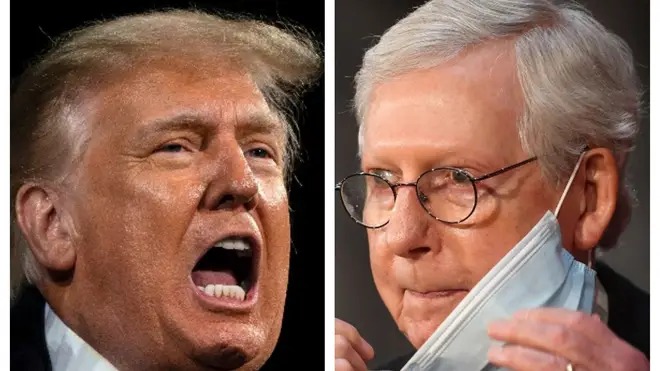
Vanessa Feltz 3pm - 6pm
13 January 2021, 22:54

Mr McConnell will be Washington’s most powerful Republican once US President-elect Joe Biden is inaugurated.
Senate majority leader Mitch McConnell has blocked a quick impeachment trial for President Donald Trump but has not ruled out voting to convict him.
A spokesman for Mr McConnell said the leading Republican had informed Democrats that he would block their effort to quickly call the chamber back into an emergency session to put Mr Trump on trial.
The House of Representatives voted 232-197 to impeach Mr Trump, and Mr McConnell’s move means the Senate trial is all but certain to be delayed until after Joe Biden’s inauguration as president on January 20.

Yet in a letter to his Republican colleagues, Mr McConnell acknowledged he had not made up his mind about whether Mr Trump should be convicted of the House’s charge that he incited insurrection by exhorting supporters who violently attacked the Capitol last week, resulting in five deaths and a disruption of Congress.
“I have not made a final decision on how I will vote and I intend to listen to the legal arguments when they are presented to the Senate,” Mr McConnell wrote.
Mr McConnell’s statement was a stark contrast to the support – or at times, silence – he has shown for much of what Mr Trump has done or said during his presidency. Mr McConnell will be Washington’s most powerful Republican once the Democrat Mr Biden is inaugurated, and Mr McConnell’s increasingly chilly view of Mr Trump could make it easier for other Republicans to turn against him.
Earlier, a Republican strategist said Mr McConnell has told people he thinks Mr Trump perpetrated impeachable offences. Mr McConnell also saw House Democrats’ drive to impeach Mr Trump as an opportune moment to distance the Republican Party from the tumultuous, divisive outgoing president, according to the strategist.
Mr McConnell’s views were first reported by The New York Times.

Mr McConnell spoke to major Republican donors last weekend to assess their thinking about Mr Trump and was told that they believed Mr Trump had clearly crossed a line, the strategist said. Mr McConnell told them he was finished with Mr Trump, according to the consultant.
Mr McConnell’s alienation from Mr Trump, plus the 10 House Republicans who voted to impeach him, underscored how the Republican Party’s long, reflexive support and condoning of Mr Trump’s actions is eroding.
The Senate is in recess and is not scheduled to hold a business session until January 19, the day before Mr Biden’s inauguration. By law, the Senate can be summoned to return for an emergency session if the two party leaders, Mr McConnell and minority leader Chuck Schumer, agree.
Mr Schumer has called for an emergency Senate meeting so it can remove Mr Trump from office before his term expires, citing potential, unpredictable problems that Mr Trump could cause.
A spokesman for Mr McConnell confirmed that his aides had told Mr Schumer’s office that he would not agree to an emergency session. The spokesman offered no explanation of Mr McConnell’s reasoning.

The Democratic-led House approved an impeachment article accusing Mr Trump of inciting insurrection, an unprecedented second impeachment of his presidency. Mr Trump exhorted a throng of his followers to march on the Capitol last Wednesday, where they disrupted Congress’ formal certification of Mr Biden’s win in a deadly riot that produced widespread damage.
Mr McConnell is looking out for his party’s long-term future, but in the short-term moving toward a political divorce from Mr Trump could mean that congressional Republicans will face challenges in primaries.
It is unclear how many Republicans would vote to convict Mr Trump in a Senate trial, but it appears plausible that several would. So far, senator Lisa Murkowski has said she wants Mr Trump to resign and senator Ben Sasse has said he would “definitely consider” House impeachment articles.
Complicating thinking about Mr Trump’s second impeachment is that Republicans will be defending 20 of the 34 Senate seats up for election in 2022. Thanks to Democratic victories this month in two Georgia run-off elections, Democrats are about to take control of the chamber by 50-50, with vice president-elect Kamala Harris casting tie-breaking votes.